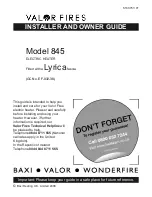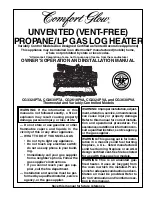
46
9. MAINTENANCE AND CARE
A
WARNING:
Check the heater for possible rodent
nests after long periods of non-use.
Perform the following maintenance operations one
year after initial start-up and then semi-annually.
1. Inspect and operate all controls, gas valve and
pressure relief valve (if equipped).
2. On indoor heaters, clean room intake openings to
ensure adequate flow of combustion and ventilation
air.
A
CAUTION:
Combustion air must not be contaminated
by corrosive chemical fumes which can damage the
heater. Such damage will not be covered under warranty.
3. Keep area around heater clear and free from
combustible materials, gasoline and other flammable
and corrosive vapors and liquids.
If Heater Will Not Fire:
If you have no electrical power, it may be that your “circuit
breaker” has tripped. Try re-setting it.
If you have electrical power but the heater will not fire
check the following or see
"Troubleshooting"
on page
47
:
1. The time clock must be in the ON position.
2. Your pump strainer basket may be full. If so, remove
debris.
3. Your filter may be dirty. If so, backwash or clean
filter. (To tell if your filter is dirty, look to see if the filter
pressure reading is higher than usual).
4. The pump may have lost its prime and be running
dry. Check the pressure on the filter. If there is no
pressure; then you are not moving water (or your
gauge is broken). Try to get the pump to run at its
normal flow rate.
Cold Weather Operation
Important Freeze Information
MODERATE CLIMATE:
Heater operation can continue
during short-term cold spells. When temperatures are
between 0°F (-18°C) and 32°F (0°C), flow (continuous
pump operation) must be maintained.
A
CAUTION:
Do not use the heater to maintain
water temperatures just above freezing or for freeze
protection. When heater is used during freezing weather,
care must be taken to avoid freeze-ups. Continuous
pump operation is a must. Additional protection may be
required. The heater is not warranted against freeze-ups.
COLD CLIMATE:
Prolonged operation with water
temperatures below 50°F (10°C) is not recommended.
When starting the heater with water temperatures below
50°F (10°C), operate the heater continuously until higher
temperatures are reached. Operating the heater for
prolonged periods with pool water below 50°F (10°C)
can seriously damage the heater, and is not covered by
the warranty. For cold climate areas, please follow the
winterizing procedures listed below.
Winterizing the Pool and Spa Heater
Heaters installed outdoors in freezing climate areas may be
shut down for the winter. Observe the following procedure
for winterizing the heater:
1. Turn off gas valve, manual gas valve, and electrical
supply to the heater.
2. On the water connection, close any isolation valve
to isolate the heater. Remove the lower right access
panel to reveal the right side of the Inlet/Outlet header.
The drain will be located underneath the header.
Loosen and remove the drain plug. See
Figure 74
.
DRAIN PLUG
O-RING
Figure 74. In/Out Header with Drain Plug
Summary of Contents for AVIA 264A
Page 67: ...67 2 H 1 R 1 H 7 S 2 C 3 C 5 S...
Page 68: ...68 1 F 2 F 2 G 1 M 4 M 5 M 6 M 7 M 8 M 10 M 6 G 3 G 4 G...
Page 69: ...69 1 B 2 B 2 F 1 P 3 P 2 P...
Page 70: ...70 1 V 2 V 3 V 11C 11 M OPTIONAL...
Page 71: ...71 14 H 15 H 4 H 12 M 7 H 9 H 7 C 8 C 12 H 13 H 16 H 11 H 10 H 10 C 9 C 8 H 6 H 5 H 3 H...
Page 146: ...67 2 H 1 R 1 H 7 S 2 C 3 C 5 S...
Page 147: ...68 1 F 2 F 2 G 1 M 4 M 5 M 6 M 7 M 8 M 10 M 6 G 3 G 4 G...
Page 148: ...69 1 B 2 B 2 F 1 P 3 P 2 P...
Page 149: ...70 1 V 2 V 3 V 11C 11 M OPTIONAL...
Page 150: ...71 14 H 15 H 4 H 12 M 7 H 9 H 7 C 8 C 12 H 13 H 16 H 11 H 10 H 10 C 9 C 8 H 6 H 5 H 3 H...
















































